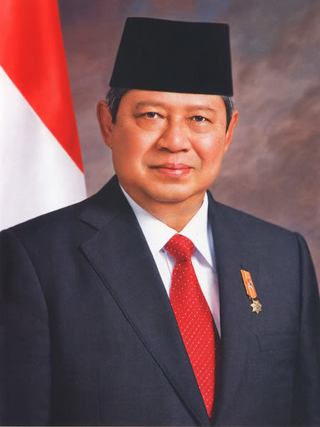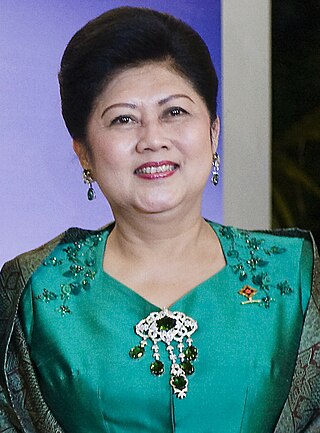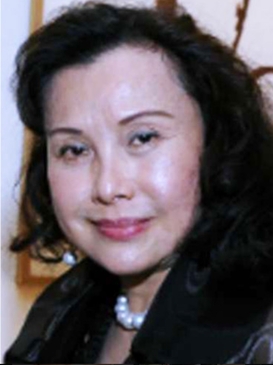Related Research Articles

A domestic worker is a person who works within a residence and performs a variety of household services for an individual, from providing cleaning and household maintenance, or cooking, laundry and ironing, or care for children and elderly dependents, and other household errands. The term "domestic service" applies to the equivalent occupational category. In traditional English contexts, such a person was said to be "in service".

Susilo Bambang Yudhoyono, commonly referred to as SBY, is an Indonesian politician, painter and retired army general who served as the sixth president of Indonesia from 2004 to 2014 and the second Indonesian President from the military after Suharto. He founded the Democratic Party of Indonesia, he served as the 4th leader of the Democratic Party from 2014 until 2020, 8th and 10th Coordinating Minister of Politics and Security Affairs of Indonesia from 2000 until 2001, and again from 2001 until 2004. He also served as the president of the Assembly and chair of the Council of the Global Green Growth Institute. He was also the former chairman of ASEAN due to Indonesia's hosting of the 18th and 19th ASEAN Summits.

Filipinos in Hong Kong refer to the Filipinos residing or working in Hong Kong. They constitute the largest ethnic minority in Hong Kong, numbering approximately 130,000, many of whom work as foreign domestic helpers. The Eastern District has the highest concentration of Filipino residents in Hong Kong, with 3.24% of the district's population being of Filipino descent.

Kristiani Herrawati Yudhoyono, more commonly known as Ani Yudhoyono, was an Indonesian political and female activist, who was the wife of former Indonesian President Susilo Bambang Yudhoyono and First Lady of Indonesia from 2004 until 2014.

Indonesians in Hong Kong, numbering 102,100, form the second-largest ethnic minority group in the territory, behind Filipinos. Most Indonesians coming to Hong Kong today are those who arrive under limited-term contracts for employment as foreign domestic helpers. The Hong Kong Immigration Department allows the Indonesian consulate to force Indonesian domestic helpers to use employment agencies. Indonesian migrant workers in Hong Kong comprise 2.4% of all overseas Indonesian workers. Among the Indonesian population is a group of Chinese Indonesians, many of them finding refuge in Hong Kong after the civil persecution of them.

Foreign domestic helpers in Hong Kong are domestic workers employed by Hongkongers, typically families. Comprising five percent of Hong Kong's population, about 98.5% of them are women. In 2019, there were 400,000 foreign domestic helpers in the territory. Required by law to live in their employer's residence, they perform household tasks such as cooking, serving, cleaning, dishwashing and child care.

Sri Mulyani Indrawati is an Indonesian economist who has been Minister of Finance of Indonesia since 2016; previously she served in the same post from 2005 to 2010. In June 2010 she was appointed as managing director of the World Bank Group and resigned as Minister of Finance. On 27 July 2016, Sri Mulyani was reappointed as Minister of Finance in a cabinet reshuffle by President Joko Widodo, replacing Bambang Brodjonegoro.
Malaysia ratified the 2000 UN TIP Protocol in February 2009.
Vallejos and Domingo v. Commissioner of Registration was a court case against the government of Hong Kong by two foreign domestic helpers (FDHs) seeking permanent residence and the right of abode in Hong Kong. Because of its subject matter it was commonly referred to in the media as the FDHs' right of abode case (外傭居港權案). Evangeline Vallejos and Daniel Domingo were two of five applicants who in various groups filed three right of abode lawsuits in 2010; the ruling in Vallejos' case was expected to be a precedent for the other two.
Women migrant workers from developing countries engage in paid employment in countries where they are not citizens. While women have traditionally been considered companions to their husbands in the migratory process, most adult migrant women today are employed in their own right. In 2017, of the 168 million migrant workers, over 68 million were women. The increase in proportion of women migrant workers since the early twentieth century is often referred to as the "feminization of migration".

Cambodia–Malaysia relations are foreign relations between Cambodia and Malaysia. Both countries are members of ASEAN. Cambodia has an embassy in Kuala Lumpur, and Malaysia has an embassy in Phnom Penh.

Indonesia–Kuwait relations was officially established on February 28, 1968. The relations focused on economy and trade sectors, especially on energy (oil) and human resources. Kuwait have an embassy in Jakarta, while Indonesia have an embassy in Kuwait City. Both countries are the member of Organisation of Islamic Cooperation and Non-Aligned Movement.
The following lists events that happened during 2014 in Indonesia.
Indonesian migrant workers are Indonesian citizens who work in countries outside of Indonesia.
As the number of foreign domestic workers continues to increase around the world, social movements to protect them have begun. The increase in social movements can be attributed to the rise of globalization, increased flows of migratory workers, and issues arising from the neoliberal management of workers. Repeated complaints and demands by pro-labor movements typically revolving around issues such as minimum wage and insurance coverage can be seen. These demands usually move away from a narrative of labor disputes and begin to encompass a human-rights perspective.
Suara is an Indonesian-language newspaper published fortnightly in Hong Kong. Founded in 2002, it is popular among the territory's population of approximately 150,000 Indonesian domestic workers. A 2007 profile in The Jakarta Post called Suara the "principal Indonesian language-newspaper in Hong Kong".

On the morning of 26 July 2016, Burmese maid Piang Ngaih Don was found tortured, starved and beaten to death in a flat in Bishan, Singapore.
Maid abuse is the maltreatment or neglect of a person hired as a domestic worker, especially by the employer or by a household member of the employer. It is any act or failure to act that results in harm to that employee. It takes on numerous forms, including physical, sexual, emotional, and economic abuse. The majority of perpetrators tend to be female employers and their children. These acts may be committed for a variety of reasons, including to instil fear in the victim, discipline them, or act in a way desired by the abuser.
On 2 December 2001, a 19-year-old Indonesian maid, Muawanatul Chasanah, was found beaten to death in a house by the Bedok Reservoir, Singapore.

On 19 March 2014, at her bungalow in Bukit Timah, 69-year-old Nancy Gan Wan Geok was murdered by her newly hired maid, an 18-year-old Indonesian named Dewi Sukowati, who slammed Gan's head against a wall before throwing her body into a swimming pool of Gan's house, resulting in Gan's death from a brain injury and drowning. Gan, a socialite, had allegedly abused Dewi and it resulted in Dewi killing her in retaliation. Dewi was arrested and charged with murder, but after she was assessed to be suffering from diminished responsibility at the time of the offence, Dewi's murder charge was reduced to manslaughter before her trial started. Dewi pleaded guilty to the reduced charge and was sentenced to 18 years' imprisonment on 31 May 2016.
References
- ↑ "Woman charged in Hong Kong with torturing Indonesian maid". Daily News. New York. 23 January 2014. Retrieved 23 January 2014.
- ↑ "Indonesian President Susilo Bambang Yudhoyono calls tortured maid Erwiana Sulistyaningsih". News.com. 21 January 2014. Retrieved 23 January 2014.
- 1 2 3 "Mimpi Kuliah Akuntansi, Erwiana Malah Sengsara Jadi TKI..." (in Indonesian). Kompas.com. 21 January 2014. Retrieved 24 January 2014.
- 1 2 "Outrage in Hong Kong over Indonesian abuse case". Modesto Bee. 16 January 2014. Archived from the original on 23 January 2014. Retrieved 23 January 2014.
- 1 2 "Charges filed against HK employer for attack on Indonesian maid". Philippine Daily Inquirer. Retrieved 23 January 2014.
- ↑ "Anger over Hong Kong maid-abuse case". Al Jazeera. Retrieved 23 January 2014.
- ↑ "Hong Kong police charge woman with assaulting Indonesian maid". The Guardian . Retrieved 23 January 2014.
- ↑ "Torture case spotlights maid abuse issue in Hong Kong". Arab News. 23 January 2014. Retrieved 23 January 2014.
- ↑ "Hong Kong police investigate claims that Indonesian maid was tortured". The Guardian. 23 January 2014. Retrieved 23 January 2014.
- ↑ "Hong Kong woman guilty in Indonesian maid abuse case". Associated Press. Retrieved 10 February 2015.
- ↑ Time's 100 Most Powerful People Time. Retrieved 25 April 2014.
- ↑ BMI Hong Kong Erwiana Termasuk 100 Tokoh Paling Berpengaruh di Dunia Archived 26 April 2014 at the Wayback Machine Kompasiana. Retrieved 25 April 2014.